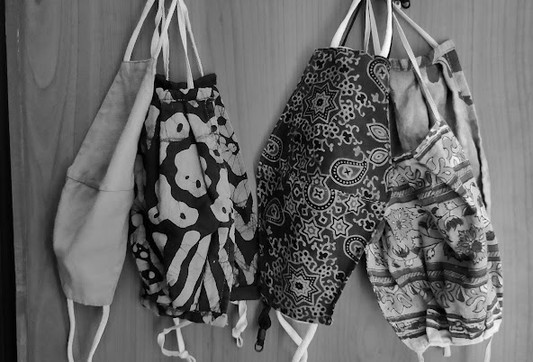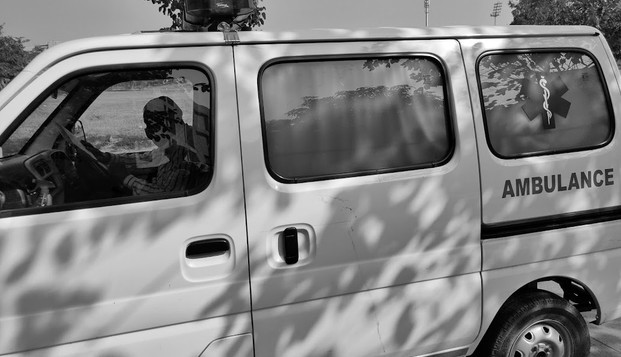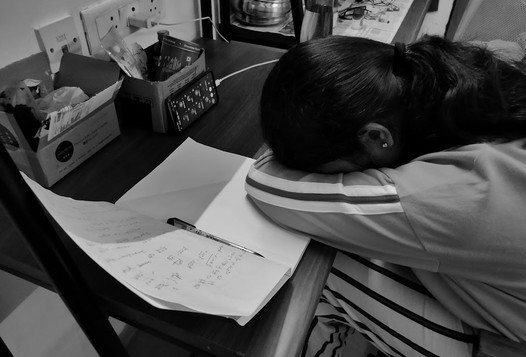Creating Hope: The Story of a Madgul Girl
These last two years of the Covid-19 pandemic have afflicted all of us to an unfathomable extent! It has altered the way we used to live our life. Moreover, it has changed our experiences of living and thinking about life. We are concerned about the virus, experiencing a sense of foreboding about the future, tired of social isolation and quarantine and trying to connect the world in new ways, engaging with society through digital media and technology on a day to day basis. However, even during this gloomy atmosphere, there were numerous stories of hope, perseverance, resilience and inspiration. In one of the stories, I will talk about a girl named Chitralekha at IIT Gandhinagar, pursuing a Master’s degree in Humanities and Social Science department. Chitralekha hails from a place named Madgul, Rangareddy district in Telangana. The story I am sharing in this photo essay is situated during the covid pandemic which reflects the struggle of her life and how she dealt with the physical, mental and emotional trauma in the last two years.
She had to cancel admission on her favourite subject, Sociology at the University of Bristol in London. The reason for it is because there was lack of information regarding the funds, and many scholarship sites were (and still are) closed due to the pandemic. Further, I also felt extremely disheartened during one of our chats to hear the story that she was subject to physical abuse from her father for getting admission at such a prestigious university abroad.
The lack of awareness that her parents have on higher education has made her come across as a culprit in front of her family. Moreover, her parents are anxious and scared about the fact that she won’t marry the boy they have selected for her. Dowry also comes into play for such kinds of apprehension.
She believes that the major disagreements to continue to study is owing to this very apprehension. The girls in her village are not encouraged to pursue higher education in general. Instead, they are forced to partake in agricultural activities and later are mostly allowed to do diploma courses to be prepared for marriages. Although Chitralekha wanted to carry on with her education, it has passively and actively been shown a plethora of times that her parents and society, in general, do not conform to her wish. It has also been reiterated on numerous occasions that the higher the education of a girl is, the higher the dowry becomes! Even after she was done cancelling her admission at the University of Bristol, there were multiple cases of emotional blackmail at home for every little thing. She became a constant target of vitriol and maltreatment for her innocent ambition to continue her study further.
After not being able to pursue sociology at the University of Bristol, she got into the Society and Culture program at the IIT Gandhinagar. She thought that the course would help her prepare for the civil service examination(s). Her parents were not happy after listening to the fee structure as they are going through a major financial crisis. Since the parents have to follow the quintessential societal norms, Chitralekha faces these agonizing issues on a regular basis and has to voice out her opinion of why she wants to continue studying.
Although she understands her family’s situation, she can not compromise her dreams for them. She somehow convinced her parents to pay the fees by informing them about the stipend she would be getting during her study. Since the covid -19 pandemic is going on, the college has asked her to pay the tuition fee, which reduces the burden of being dependent. It was a burden because her mother’s health was not good, and she had to go through an operation. For a family like her who is dependent on agriculture and does small business, it has become challenging to manage household and hospital expenses and the academic cost of three girl children.
In all these circumstances, Chitralekha understood the financial condition which was not well at home and as a result, she had to do a part-time job as a translator under her undergraduate professor. There was also a strict restriction from her father that she was not supposed to continue her education and was rather instructed to get married and lead a family life after her Master’s. To make the situation calm, she accepted the restriction for the time being. However, she later revolted against her parents’ decision. Chitralekha informed her parents that she was ready to leave the home if her parents were not allowing her to continue her education. It was also the point that the family got to know that her mother had chronic health issues. It was advised by the doctor to have the uterus operation. Due to the low haemoglobin levels, she took more time to recover. Further, in the midst of this distress, she had to go through a lot of emotional abuse by the relatives for not getting married and being a burden to the family. Although the relatives used to love her for her behaviour and academic excellence in school, they later turned against her for her unwavering determination to continue the education. Even so, every now and then, heated arguments would pop up at home over this very issue. However, Chitralekha is steadfast in her resolve. She knows that if she doesn’t raise her voice now she has to pay for it for her entire life.
One day, while she was nursing her mother and doing all the household chores, she realised how difficult it would have been for her mother to balance both the household chore work and agriculture work. Having said that, none of the family members helped in any of this. Her mother didn’t let her work on a regular basis with the fear that she might get tired and won’t be able to study. It was the first time she had to do everything by herself, including cooking food for a family of six members. Along with this, she worked as a volunteer in the SWAN (Stranded Workers Action Network), an organisation that tried to help migrant workers with transportation and ration through phone calls during the Pandemic. All this happened during the first semester which impacted her academic activities at IIT Gandhinagar. It’s surprising that when she was narrating the story, she was smiling throughout. She is the first girl child to come out of her village and have higher education. The other students in the village look up to her as a source of inspiration.
I personally found her life interesting because a few other girls from her village have started coming out of their shell to continue education by seeing her never- ending determination in the face of Himalayan adversities. She often goes to a government school and teaches certain subjects like English and Sociology and talks about the importance of education, especially for girls. She is thus paving the way for greater social security for girl children in her village and is often credited for preventing a few child marriages on her own volition. Now she says that she wants to be a civil servant and be the reason of smile for more girl children by continuing her struggle against child marriages and child labour.






